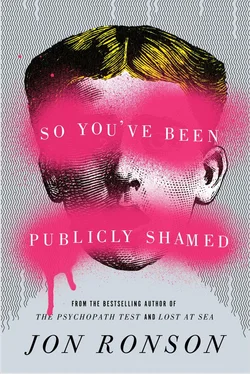And so on, until late that evening, when this tweet arrived.
Journalism foundation apologizes for paying $20,000 to disgraced author Jonah Lehrer.
Jonah e-mailed. “Today was really awful. I’m filled with all sorts of regret.”
I sent him a sympathetic reply. I said I thought he should donate the $20,000 to charity.
“Nothing can turn this around,” he replied. “I’ve got to be realistic about that. I shouldn’t have accepted the invitation to speak, but now it’s too late.”
• • •
Fuck off, you can’t even do your apology without slotting it into some stupid Jonah framework,” Michael Moynihan said to me over lunch at Cookshop in New York City. Michael shook his head in wonder. “That wasn’t an apology. It was a string of Gladwellian bullshit. He was on autopilot. He was a robot: ‘Let me get this study from some academic.’ All the words he used to describe his dishonesty. It was like a thesaurus had landed on his head.” Michael paused. “Oh!” he said. “Someone sent me a text. I thought he was reading way too much into it. But he pointed out to me that Jonah said, ‘I lied to a journalist CALLED Michael Moynihan.’ I love that. I said, ‘Yeah. I see what you’re saying.’ He didn’t lie to ‘journalist Michael Moynihan.’ That’s the great trick of the language. ‘A journalist CALLED Michael Moynihan.’ ‘Who’s this fucking schlub?’”
Michael took a bite of his steak. The fact was, his was a great scoop. It was great journalism, and what did Michael get from it? Some congratulatory tweets, which probably give you a bit of a dopamine rush or something, but otherwise nothing: $2,200 plus a veiled insult from Jonah if Michael and his friend weren’t being paranoid about that part.
Michael shook his head. “Nothing came out of this for me,” he said.
—
In fact, it was worse than nothing. Michael had noticed that people were starting to feel scared of him. Fellow journalists. A few days before our lunch, some panicked writer — someone Michael barely knew — had confessed out of the blue that a biography he’d written might have inadvertently veered into plagiarism.
“Like I adjudicate these things,” said Michael.
Whether Michael liked it or not, there was fear in the air now because of what had happened to Jonah. But Michael didn’t want to be some witchfinder general, roaming the countryside with writers blurting out declarations of guilt to him, begging his forgiveness for crimes he hadn’t known they’d committed.
“You turn around and you suddenly realize you’re the head of a pitchfork mob,” Michael said. “And it’s ‘What are these people fucking doing here? Why are they acting like heathens? I don’t want to be associated with this at all. I want to get out of here.’”
“It was horrible ,” I said. “All this time I’d been thinking we were in the middle of some kind of idealistic reimagining of the justice system. But those people were so cold .”
The response to Jonah’s apology had been brutal and confusing to me. It felt as if the people on Twitter had been invited to be characters in a courtroom drama, and had been allowed to choose their roles, and had all gone for the part of the hanging judge. Or it was even worse than that. They all had gone for the part of the people in the lithographs being ribald at whippings.
“I’m watching people stabbing and stabbing and stabbing Jonah,” Michael said, “and I’m, ‘HE’S DEAD .’”
• • •
The next day I drove from New York to Boston to visit the Massachusetts Archives and the Massachusetts Historical Society. Given how vicious the resurgence of public shaming had suddenly turned, I wondered why that type of punishment had been phased out in the nineteenth century. I had assumed — like most people do, I think — that this demise was due to the migration from villages to cities. Shame became ineffectual because pilloried people could lose themselves in the anonymous crowd as soon as the chastisement was over. Shame had lost its power to shame. That was my assumption. Was it right?
I parked my car outside the Massachusetts Archives, a slablike Brutalist building on the waterfront near the John F. Kennedy Presidential Library and Museum. Inside were the microfilms that preserve early legal documents handwritten by the Puritan settlers. I took my seat at a microfilm reader and began to carefully scroll through them. For the first hundred years, as far as I could tell, all that happened in America was that various people named Nathaniel had purchased land near rivers. The spindly words swirled on the fraying pages. They really should have spent more time on paragraph breaks back then and less time on the letter f . I began to speed up, scrolling unprofessionally, decades passing before me in seconds, until I suddenly found myself face-to-face with an early American shaming.
It was July 15, 1742. A woman named Abigail Gilpin, her husband at sea, was found “naked in bed with one John Russell.” They were both to be “whipped at the public whipping post twenty stripes each.” Abigail was not appealing the whipping itself, but was begging the judge to “let me have my punishment before the people are stirring. If your honor pleases, take some pity on me for my dear children, who cannot help their mother’s unfortunate failings.”
The documents don’t reveal whether the judge consented, but straight after that, I found a transcript of a sermon that offered a clue as to why she might have pled for a private whipping. The sermon, by the Reverend Nathan Strong of Hartford, Connecticut, was an entreaty to people to be less exuberant at executions: “Do not go to that place of horror with elevated spirits, and gay hearts, for death is there! Justice and judgment are there! The power of government, displayed in its most awful form, is there… The person who can go and look on death merely to gratify an idle humor is destitute both of humanity and piety.”
After lunch, I traveled the few miles to the Massachusetts Historical Society, a grand old townhouse on Boylston Street. I remembered something Jonah had e-mailed me before I flew to Los Angeles: “The shaming process is fucking brutal.” I thought about the phrase “shaming process.” It was probably reassuring for a shamee to envisage their punishment as a process rather than a free-for-all. If you’re being destroyed, you want to feel that the people tearing you apart at least know what they’re doing. Well, maybe less delicate shamees wouldn’t care how orderly their shaming was, but Jonah struck me as someone for whom structure was important and someone who had only ever wanted to impress people and fit in.
It turned out that public shaming had once been a process. A book of Delaware laws I discovered at the Massachusetts Historical Society revealed that if Jonah had been found guilty of “lying or publishing false news” in the 1800s, he would have been “fined, placed in the stocks for a period not exceeding four hours, or publicly whipped with not more than forty stripes.” If the judge had chosen a whipping, local newspapers would have published a digest detailing the amount of squirming that had occurred. “Rash and Hayden squirmed considerably during the performance, and their backs were well-scarred,” wrote the Delawarean of an 1876 whipping. If Jonah’s whipper had been deemed to have not whipped hard enough, the reviews would have been scathing. “Suppressed remarks were expressed by large numbers. Many were heard to say that the punishment was a farce. Drunken fights and rows followed in rapid succession,” reported Delaware’s Wilmington Daily Commercial after a disappointing 1873 whipping.
Читать дальше












